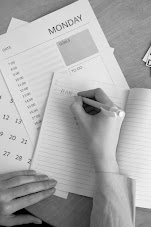The Power of Logging
Dear Real Academics,
There's a pattern among productivity strategists: If you want results, track your progress.
Whether I'm watching a video or reading about financial planning, nutritional well-being, exercise programs, writing productivity, or self management in general, all programs that WORK have some element of what I default to calling "logging". I default to this term because of my experience with logging with writing (more on that below).
Logging is tracking your progress.
I know, I know...it sounds dull and mundane and boring and hard to remember to do. It may even sound rigid, but here's the news: It is powerful.
Why? This is a good question. For this post, I will not get into any facts or figures or empirical data to prove to you that tracking your progress is powerful when it comes to making progress.
But, reflect on your own experience. When have you made real progress on any goal you had that required change/effort/difficulty? What did it look like? What did you do?
I am willing to bet you had SOME form of tracking within whatever successful system/plan you developed -- be it a list of goals, a to-do checklist, a financial budget, a calorie counter, a "how many steps I walked" counter (hence, the Apple watch), a reflection journal accounting progress...something that "tracked".
In my own training as an academic writer, I learned about logging my writing based on successful research with academic writers (thank you to Dr. Pat Goodson's P.O.W.E.R. writing program!).
I've told this story many times before during writing workshops, but when I started keeping track of my writing time each day as a graduate student (some people track pages or word counts), I realized I was not writing at all! I was doing a ton of reading and analysis, but ZERO writing. This was an important revelation that I would not have had, had I not logged. I also realized that the majority of my time was going to...gasp...social media! So, I deactivated my social media accounts so I could focus on my writing and graduating with my Ph.D. It worked.
The realizations I gained from logging writing included: the motivation to remove distractions and get writing, to log my time, and to watch that time (and writing progress) grow over time. It was amazing! I finished my dissertation and graduated with so much less stress than I could have had. And to this day, when I log, I get big projects done with less stress and time to spare.
But...
I must do it. There's the rub. Logging for productivity is not just a magic pill or magic bean that will take all my stress away and make things appear (or disappear). Logging is a way to keep myself accountable to "doing" whatever it is I need to do to get things accomplished. For example, if I have a big writing project to accomplish in a week, I'll backwards plan what small steps I need to do each day to finish. I'll then use the log to record small steps each day until the project is done.
Last, logging is not the sole answer to productivity, but it certainly is a powerful tool. Personally, it helps me with motivation and accountability, which are pretty big factors in my own productivity.
What do you need to make progress on? Is it weight loss? Financial peace? An exercise routine? Healthier eating? Grading a stack of papers? Packing? Cleaning the house? Writing a paper/thesis/book/anything? A school or work project? Try the log and see what happens. You have nothing to lose and everything to gain by trying.
Last, check out my short YouTube video, "The Power of Logging" to see an example of how to log.
Until next time,
Maggie



Comments